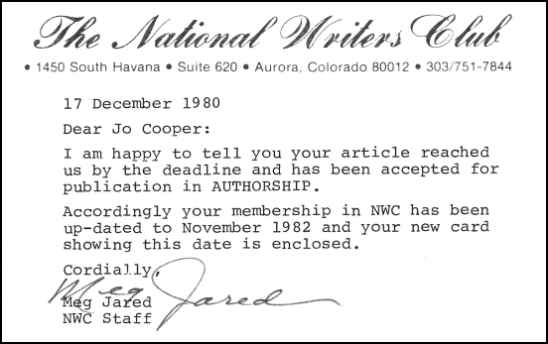
 |
WRITER'S EGO by Jo Cooper 1980 |
|
"Who am I to try to write?" This ego problem plagues the most famous writers, but to an unpublished or
beginning writer it can cause a serious writing block. One of the best ways I know to help yourself over this block is to attend a Writers Workshop. I've studied writing for 34 years, sold my first article in 1960, but it took the national Writers Workshop in San Diego last fall to change me from a "hobby writer" to a "professional writer." I spent two intense days listening to the pro's, talking to other writers, and being treated like a writer in the plush atmosphere of the beautiful, national landmark Hotel del Coronado on the Pacific Ocean. The key to most of the sessions was to teach would-be writers to act like they already were successful writers. Thus by acting and feeling like one, you could become one. The night the conference ended, my writing block burst and I drove home the next day with a notebook crammed with 11 new ideas. Within two weeks, I had a spec-assignment for a $750 article for TV Guide and I know it was because I put into practice just three of the many things I leaned at the Workshop. 1. Essence sentence Ron Deutsch told us we must have an "essence sentence." "pretend your're writing an ad for your book (or article, etc.). Work until you have one sentence that the book salesman can use to sell your book. Any story can be told in three sentences, the beginning, middle, and end." 2. Act the part "Act like a professional writer!" Joe Bell said. "Phone an editor if you have a really good idea. It's not that expensive before 8 a.m." (He meant 8 a.m. West Coast time/11 a.m. New York time) We shook our heads in disbelief. During the question period I asked, "If I call a sports magazine editor about an article I'm doing on Steve Yeager, the Dodger catcher, what would I say?" "Tell him....tell me now, in one sentence, why should I publish your article?" I stammered about ten sentences, none of which was really the essence sentence. As soon as I got home to my Yeager file, I worked until I came up with "I'd like to submit an article, on spec, about Steve Yeager, Los Angeles Dodger catcher, about the importance of defensive catching." I had an idea that would interest the Baseball Digest editor. 3. Rough drafts should be rough And Lois Duncan said something that really helped me (not to mention all the information I got from buying her book, How to Write and Sell Your Personal Experiences. She said, "I've left explicit directions that when I die, they are to burn any rough drafts I have laying around, and there will probably be six on my desk." We laughed but it was good to be reminded that even pro's write rough drafts they don't let their mothers read. All of us get in a slump occasionally, especially after a few rejections. I highly recommend that you thumb through the pages of this magazine right now looking for an ad for a Writers Workshop near you. Invest in yourself, just like a professional writer does, and you, too can become one |
by Ralph Cooper, 12-23-07 |


|